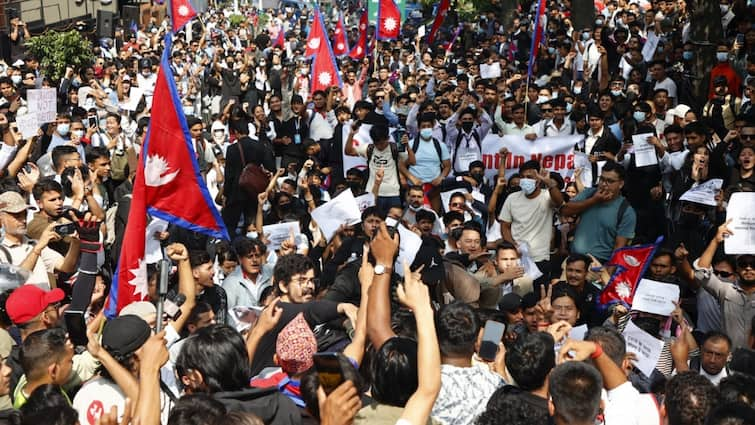Social Media Ban in Nepal: The anger of the youth of Generation Z (Gen Z) exploded on the streets against the ban imposed on social media in Nepal. During the protests, there were clashes when the situation deteriorated, in which one person died and around 80 people were injured.
The youth of Generation Z (GEN Z) are protesting extensively against corruption in Nepal and the ban imposed on social media platforms. The movement which started online earlier spread to the roads on Monday. In a clash between the protesters and the police near Parliament House, security forces opened fire in which a protestor was killed and more than 80 people were injured.
Thousands of youth gathering in Kathmandu
Thousands of students-youth came out on the streets of Kathmandu, which is now being called “Gen Z Revolution”. The protesters tried to break the barricade and enter the restricted areas. When the situation deteriorated, the police fired tear gas shells, used water canon and firing was done in many places. Seeing the situation going out of control, the administration implemented curfew in the sensitive areas of the capital, especially in Parliament.
Real reason for protest
On September 4, the government banned 26 social media platforms including Facebook, Twitter (X), WhatsApp, YouTube. The reason was told that these companies did not register in the Ministry of Information and Communications of Nepal. The government says that this step is only for “following rules” but youth and opposition parties believe that it is an attempt to suppress the voice of disagreement.
Voice raised even among internet prisoners
The government tried to stop the internet and mobile network when the situation deteriorated, but the youth resorted to platforms like Tiktok and Reddit as an alternative. Thousands of students took to the streets with flags and posters in their school and college uniforms. Their slogans were “Our independent voice is our right” and “Where did the money of taxpayers go?”
From online to parliament complex
On Monday, when the protesters reached near Parliament House, the police put barricade to stop the way. Angry mob broke them and some protesters also managed to enter the Parliament complex. During this time there was a violent conflict between the police and the protesters. In the video going viral on social media, tear gas shells and bottles and wooden branches being thrown at the police are clearly visible.
Anger arising out of corruption and inequality
Experts say that this movement is not only limited to social media ban, but is the culmination of anger towards long -running corruption and economic inequality. The ban on social media proved to be just like a spark which forced digitally active youth to take to the streets.
Oli government rescue
Meanwhile, Prime Minister KP Sharma Oli defended the social media ban and said that “playing with the country’s freedom and dignity will not be tolerated at any cost.” He said at the party conference that the government will always stand against corruption and anarchy. Oli argued that “some people are older than going to the nation’s sovereignty and respect.”
Notice to social media companies
On August 28, the Nepal government gave 7 days time to all the big social media companies to appoint a grievance redressal officer in Nepal and open an official contact office in the country. But no big company like Facebook, Instagram, WhatsApp, YouTube, Twitter (X), Redit and LinkedIn applied till the time limit.
Digital history of Nepal
Nepal has been banning online platforms before. In July, the government blocked the Telegram app in the name of online fraud and money laundering. Last year, Tiktok was banned for 9 months, which was removed when the company assured to follow the local rules.
These apps are banned
The Nepal government has banned a total of 26 social media and communication platforms including Facebook, Instagram, WhatsApp, X (first Twitter), YouTube, Snapchat, LinkedIn, Redit, Viber and Botim. However, the ticket is currently operational as it was officially registered after fulfilling all the regulatory conditions in November 2024. The special thing is that Telegram was already banned in July 2025 due to the possibility of online fraud and money laundering. At the same time, tickets were also temporary in August 2024, but later on following the rules, it was resumed.
These apps were not banned
Gurung told that five companies including tickets and vibers have registered in Nepal. Due to this, there will be no action on them. Let us know that Nepal also banned tickets in 2023. Later, when the company was ready for registration, this ban was lifted in 2024.
Also read:
Are people earning money from LinkedIn? Know what is the whole truth

